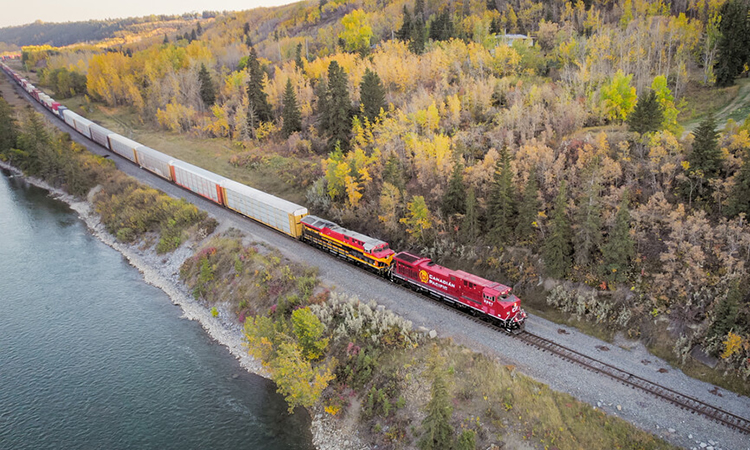Canadian Pacific and Kansas City Southern combine to create Canadian Pacific Kansas City
Posted: 14 April 2023 | Elliot Robinson (Editorial Assistant - Global Railway Review) | No comments yet
Canadian Pacific Kansas City will become the first and only single-line railway connecting Canada, the U.S. and Mexico.


Credit: Canadian Pacific
Canadian Pacific (CP) and Kansas City Southern (KCS) have combined to create Canadian Pacific Kansas City (CPKC), as authorised by the U.S. Surface Transportation Board’s (STB) 15 March 2023 final decision, creating the first single-line railway connecting Canada, the U.S. and Mexico.
“We celebrate this historic combination creating a truly unique single-line rail network that begins a new chapter of railroad history in North America,” Keith Creel, President and Chief Executive Officer for CPKC, said. “As we mark this once-in-a-lifetime occasion by driving the Final Spike in Kansas City, Missouri, where CP and KCS come together, we stand ready to bring new competition into the North American rail industry at a time when our supply chains have never needed it more. This unmatched CPKC network will give our customers new options and expanded reach to more markets as we provide reliable rail service, take trucks off public roads and raise the bar on rail safety by expanding CP’s industry-leading safety practices. The public, environmental, competitive and safety benefits of this historic combination are extraordinary for our railroaders, communities, rail customers and the North American economy.”
CP completed its $31 billion acquisition of KCS on 14 December 2021. Immediately upon the closing of that acquisition, shares of KCS were placed into a voting trust, which ensured that KCS operated independently of CP during the regulatory review process. Now, pursuant to the STB’s 15 March 2023 final decision approving the transaction, the voting trustee transferred the KCS shares to an affiliate of CP, formally bringing KCS into the CPKC family.
In Kansas City, the company will mark the creation of CPKC by hosting a celebration featuring the driving of the ceremonial Final Spike at the only place where the CP and KCS railroads meet. CPKC will also break ground on a new yard office, the future location of its state-of-the-art U.S. operations centre.
“We stand ready to move the commerce of today and ready to compete hard to grow tomorrow,” Creel continued. “With the most relevant railroad network on the continent, we’ll create value for all stakeholders, bringing new jobs, economic growth and environmental benefits to workers, customers and communities.”
Related content you will enjoy:
Canadian Pacific-Kansas City Southern merger officially approved
Amtrak and SRC seek federal funds for new long distance service
With its global headquarters in Calgary, CPKC is the only railway connecting North America and has unrivalled port access on coasts around the continent, from Vancouver to Atlantic Canada to the Gulf of Mexico to Lázaro Cárdenas on Mexico’s Pacific coast. While remaining the smallest of six U.S. Class 1 railroads by revenue, the new combined company has a much larger and more competitive network, operating approximately 20,000 miles of rail, and employing close to 20,000 people. Full integration of CP and KCS is expected to take place over the next three years, unlocking the benefits of the combination.
CPKC will bring a new safety standard to the North American rail landscape. CP has been the safest railroad in North America for 17 straight years, as measured by the Federal Railroad Administration-reportable train accident frequency ratio. In 2022, CP had an all-time best frequency of 0.93, a rate nearly half what the company produced a decade ago and 69% lower than the Class 1 average.
CP’s culture of safety, supported by its history of sustained investments in core infrastructure and technology, aligns with KCS’s like-minded culture, allowing the combined system to operate at the apex of rail safety. CPKC will place safety at the forefront of everything it does. CPKC plans capital investments in new infrastructure of more than $275 million over the next three years to improve rail safety and the capacity of the core north-south CPKC main line between the U.S. Upper Midwest and Louisiana.
Anticipated environmental benefits of CPKC include the avoidance of more than 1.6 million tonnes of greenhouse gas (GHG) emissions due to the anticipated improved operational efficiency of CPKC versus current operations and another 300,000 tonnes of GHG emissions with the diversion of 64,000 trucks to rail for a total reduction of 1.9 million tonnes of GHG emissions over the next five years. Diverting 64,000 long-haul truck shipments to rail annually with new CPKC intermodal services will reduce total truck vehicle miles travelled by almost 2 billion miles over the next two decades, saving $750 million in highway maintenance costs. CPKC will also support the expansion of Amtrak and other passenger services on the CPKC network.
Related topics
Related organisations
Canadian Pacific (CP), Canadian Pacific Kansas City (CPKC), Kansas City Southern (KCS)








